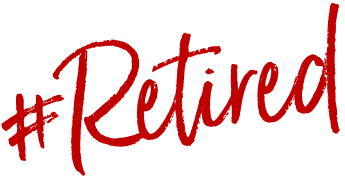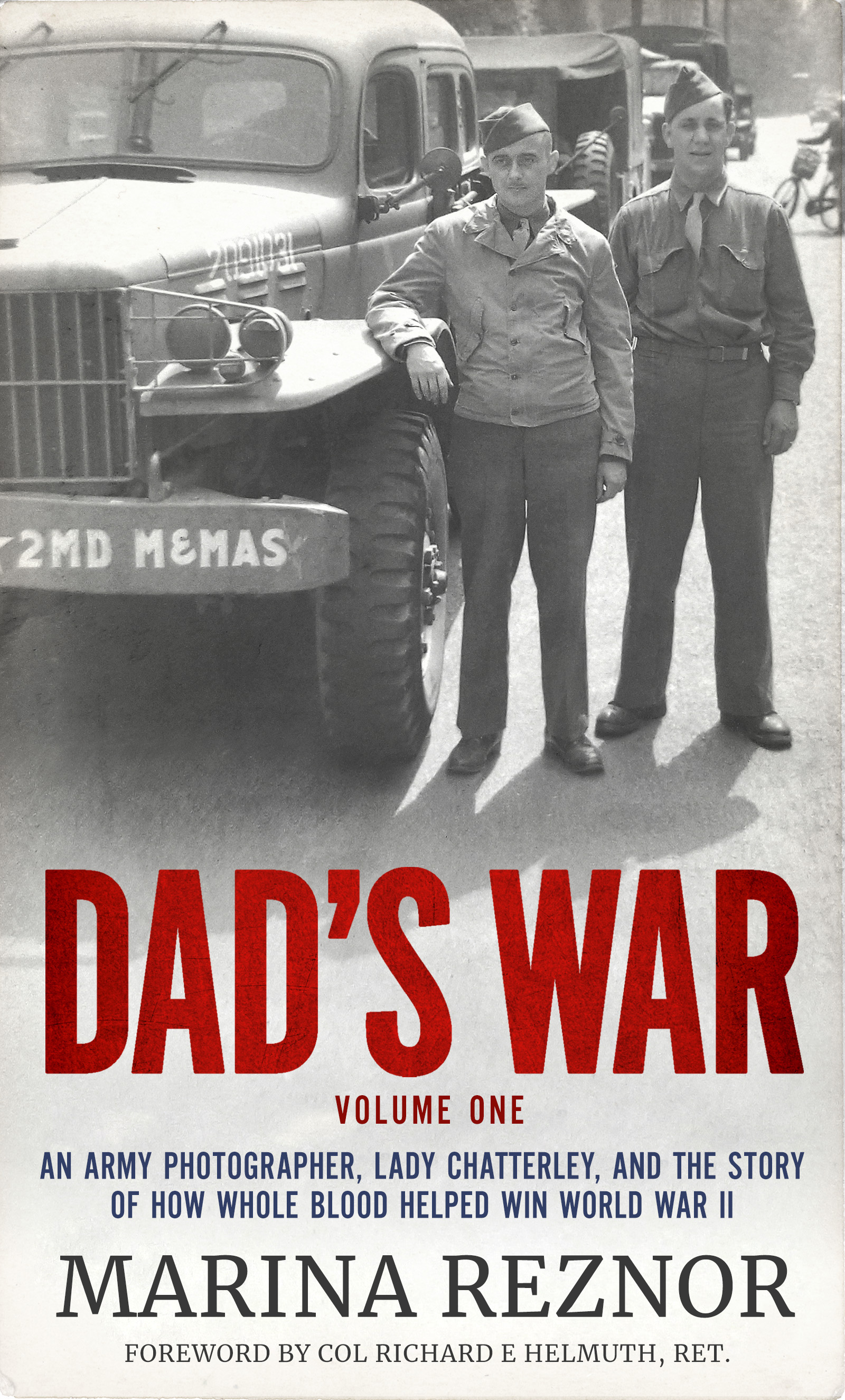Marina Reznor’s new book, above, is a pictorial memoir of her father’s experience in Europe during World War II. And it’s probably very different from anything else you’ve read because although it follows him from rural Berks County PA up to and beyond the Liberation of Paris, the real star of this book is blood. Or, more accurately, the race to obtain and store enough blood to treat the wounded in the D-Day invasion. [As an aside, many of the treatments and approaches to care we take for granted today evolved from a wartime need or experience. You can read about that in this final article on the American Policy Research Institute site.]
Marina, what made you decide to write this book now?
My father, Howard J Francis, Jr., left me over three thousand images from his war years, and I had been digitizing them off and on since 2007. Colonel Richard Helmuth gently prodded me to publish them, and suggested that the 75thanniversary of VE Day would be a good target.
My father never talked about his World War II experiences, other than describing where he served in England and a mention here and there of his training experiences here in the states. I never pressed him because it just seemed that he didn’t want to go there. I think it’s wonderful that you know so much about your father’s service.
It sounds like both of our fathers were, like many GIs, happy to put the war behind them. They were a generation that had World War I fresh in their memory, had lost friends and family in the Spanish Influenza pandemic, had suffered through the Depression, and were then asked to go back to war. Afterward they just wanted to get on with their lives.
Is it fair to say that your father’s story isn’t necessarily typical?
There’s a saying: “Interesting things happen to people who can tell a good story,” and Dad could tell great stories. His experience was unusual in that he was permitted to have a camera at a time when they were forbidden, for security reasons, and that once on the continent he and his detachment wrote their own orders. I know he would say he was very typical in that they were all cold and miserable in Paris in the winter of 1944/45. He just hated the cold.
When did you realize how significant it was that your dad witnessed an important flashpoint in medical history… the transition from plasma to whole blood?
Great question. I was reading the US Army Medical Department’s Office of Medical History series on their activities in World War II, searching for some background information on Dr. Ralph Muckenfuss, one of Dad’s commanding officers in England. The volumes were, as you can expect, written with military conciseness and mind-numbing detail.
But as I plodded through, the problems of sourcing blood for the Pacific and European war theaters began to be discussed. There was a lot of tension between the Office of the Army Surgeon General and the Army medical planning staff that was examined in great detail. The appointment of Major Hardin to address the issue of procuring enough blood to treat invasion casualties was pointed out as a pivotal moment.
I suddenly couldn’t stop reading. The authors of the series clearly wanted this story told.
Dad’s War was meticulously researched and has an extensive bibliography. Do you believe it has value beyond your father’s personal story?
Dad had a role in the much larger event, and his point of view is a good way to tell that story. I would love to find out more about the other people who were involved, especially the refrigerator mechanics who were the real heroes.
I was fascinated that your father met Gertrude Stein. I would have been tempted to ask her about her pals, all those renegades who congregated in Paris in the 1920s.
The 203rd US Army General Hospital in the Parisian suburbs was the largest on the continent and attracted many celebrities. The staff quickly grew to loathe the stars who, like today, would stop in for a two hour photo op with patients and then disappear. Gertrude Stein came every day and spent hours talking with the patients and reading to them. At that time many of her protégés were having different wars; Hemingway was a war correspondent, Picasso was largely unknown outside of the modern art world, and Matisse was unwell and self-isolating. She did, however, encourage Dad and his detachment to visit the Paris Museum of Modern Art’s reopening and first exhibition after the liberation of Paris.
I should also add that Dad said ‘Gertie’ told several hilarious off-color stories, which endeared her even more to patients but not to the female nurses.
So, you have so much material that you’ve decided to do a second book. What can you tell us about Volume II?
Selecting just 171 of Dad’s pictures to illustrate the narrative of Volume I was difficult. Volume II will be a deeper dive into the things he saw in France and Germany, especially the destruction of Saint-Lo and German cities. This is for the historical record.
Did you learn anything new about your father—personality, interests, experiences—as you researched, compiled the photos, wrote the narrative?
I had to laugh when I found his 1938 Reading High School yearbook entry. The theme that year was ‘Pioneers’, and each graduating senior was asked the following acrostic question:

Personality: Scientific (I agree)
Irritations: Women English teachers (Dad had a taste for banned books. I wonder if this got him in trouble?)
Objectives: Bio-Chemist (Close, he became a famous micro-organic chemist)
Nickname: Francis
Enjoyment: Large dogs (He loved Labradors)
Expression: Hello, son (I never heard him say that, but I was a daughter)
Record of service: Engineers, Aviation (He admired engineers but decided he could never do the math).
Thanks for making time for this interview, Marina.
Thank you for inviting me, Angela. I enjoyed our collaboration on Dad’s War. I have a question for you – has being an editor changed how you read for enjoyment?
Truthfully, I don’t think it has, except that I do take more care as I read. Although, now that you mention it, I did notice a goof in a book I started today. For the record the Rodgers and Hammerstein song is “Some Enchanted Evening” —not “One Enchanted Evening.” Writing and editing have been part of every job I’ve ever had. But working hand in hand with you has been especially enriching because it has an added layer, the grace, of a treasured friendship.
Full disclosure—I played a small role in the publication of this book and enjoyed every minute of it. Dad’s War is available electronically at this Amazon link and is free with Kindle Unlimited. Marina anticipates a paperback release sometime in October of this year. She is also the author of two snappy, delightful novels, Fowled and Booked, both set in the UK and available in several formats. Check her Amazon page or website to learn more.


francefougere
Thank you, Angela – amitiés 🙂
LikeLiked by 3 people
Angela
Alec plaisir, chere France!
LikeLiked by 1 person
Becky Ross Michael
This sounds like such an interesting book, and kudos for taking part in the publication, Angela!
LikeLiked by 2 people
Ron
You know my dad was the same, he never ever talked about his combat time. After his passing, I learned from a war buddy of his, some of what he experienced. I think it was best he didn’t share it as it would have been terrible for him to of had to relive his experiences.
What an interesting read this must be and what fun for you to have been a part of her publication. We have Kindle Unlimited so this will be enjoyed soon. Thanks for sharing…
LikeLiked by 3 people
Angela
Thank you for being part of the conversation, Ron. I always appreciate your insights!
LikeLiked by 2 people
snakesinthegrass2014
Fascinating interview, story, and probably the book too. I will definitely add it to my upcoming reading because my own father was an aerial photographer in the Army Air Force for a brief period in the Pacific towards the end of the war. Great post, Angela. – Marty
LikeLiked by 3 people
Angela
Marty, thank you so much. I hope you find it as interesting as I did.
LikeLiked by 3 people
indianeskitchen
How exciting that you took part in this book! Sounds interesting.
LikeLiked by 1 person